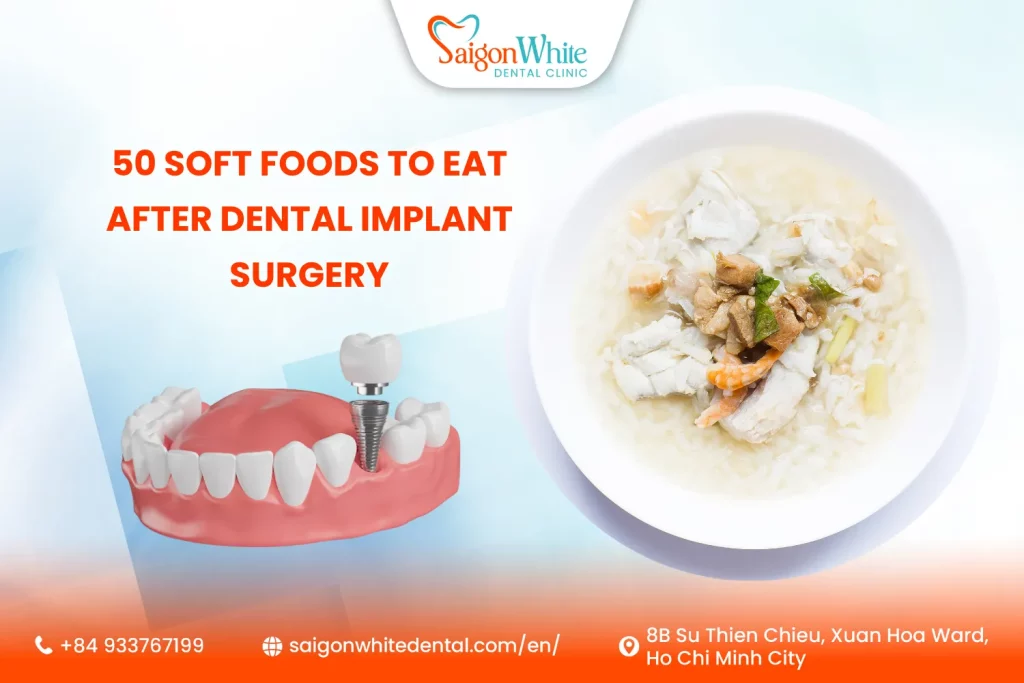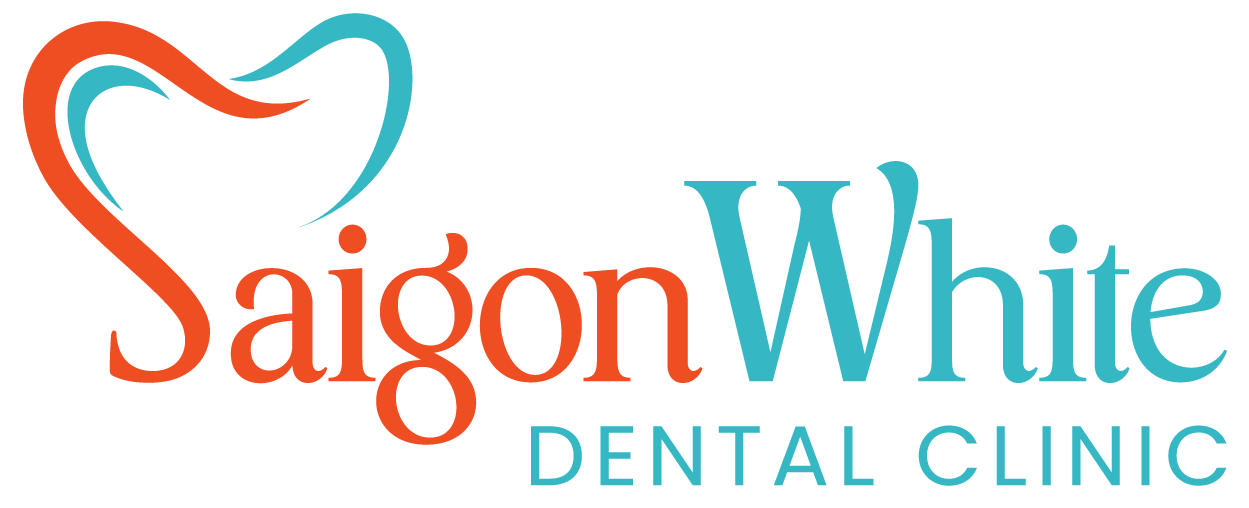Dental implant surgery is a significant step toward restoring your smile and dental function. But what comes after the procedure is just as important as the surgery itself, especially your diet. Choosing the right foods can speed up healing, reduce discomfort, and protect your new implant from complications.
To help you heal properly and eat with confidence, we’ve put together a complete guide featuring 50 soft foods to eat after dental implant surgery, along with expert tips and a recovery timeline.

When to Eat Soft Foods — Recovery Timeline Overview
First 24–48 Hours:
- Stick to liquids and very soft, cold, or room-temperature foods
- Avoid chewing altogether
Days 3–7:
- Introduce soft, warm foods that require minimal chewing
- Focus on easy-to-digest and nutrient-rich meals.
Week 2 and Beyond:
- Continue with soft foods, and slowly begin to reintroduce firmer textures
- Only start chewing near the implant site after your dentist gives the green light.
50 Soft Foods to Eat After Dental Implant Surgery
Here’s a categorized list of 50 delicious, healing-friendly foods that are gentle on your mouth but rich in nutrients.
Soups & Broths (Avoid Hot Temperature)
Soups provide hydration, warmth, and nutrients, as long as they’re not too hot or chunky.
- Pumpkin soup
- Carrot ginger soup
- Cream of mushroom
- Chicken broth
- Bone broth
- Tomato-free vegetable purée
- Lentil purée soup
- Creamy butternut squash
- Cauliflower cheese soup
- Potato leek soup (blended)
Dairy & Protein-Rich Soft Foods
Protein is essential for tissue repair and immune function. These options are soft, easy to consume, and nutrient-dense.
- Greek yogurt (plain, no fruit chunks)
- Cottage cheese
- Cream cheese
- Soft scrambled eggs
- Poached eggs
- Silken tofu
- Steamed soft fish (e.g., cod, tilapia)
- Finely shredded chicken (well-cooked)
- Blended chickpeas (hummus without garlic)
- Soft lentils (mashed)
Cooked Grains, Carbs & Comfort Foods
These starchy foods are filling and provide the energy you need while healing.
- Mashed potatoes
- Mashed sweet potatoes
- Oatmeal or cream of oats
- Polenta
- Congee (rice porridge)
- Soft-cooked white rice
- Rice noodles or vermicelli
- Macaroni and cheese (soft pasta, creamy sauce)
- Soft pancakes (no crispy edges)
- White bread without crusts
Soft Fruits & Vegetables (Cooked or Blended)
These foods are loaded with vitamins and antioxidants to support tissue healing.
- Applesauce
- Ripe avocado (mashed)
- Steamed zucchini (mashed)
- Steamed carrots (soft, no chunks)
- Banana (ripe, mashed)
- Blended spinach
- Pear purée
- Steamed pumpkin
- Mashed cauliflower
- Cooked beetroot (blended)
Smooth Snacks & Desserts (In Moderation)
These offer a bit of variety and comfort without irritating your implant site.
- Pudding
- Custard
- Jell-O
- Rice pudding
- Mousse (chocolate or vanilla)
- Soft sponge cake (no crust or nuts)
- Soft muffins (crumbled, no seeds or nuts)
- Plain ice cream (no chunks, not too cold)
- Protein smoothie (no seeds, no straw)
- Coconut milk pudding
Foods to Avoid After Dental Implant Surgery
While the soft food list is extensive, there are foods you must avoid completely during the healing phase:
- Hard foods: chips, nuts, raw vegetables
- Sticky foods: gum, caramel, toffee
- Spicy or acidic foods: hot sauce, citrus fruits
- Crunchy foods: toast, popcorn
- Hot beverages or soups (during the first 48 hours)
- Using a straw (can dislodge a blood clot)
- Alcohol and smoking (delay healing)
Bonus: Nutrients That Speed Up Healing
Incorporate these nutrients into your soft food choices to boost recovery and implant success:
| Nutrient | Why It Helps | Soft Food Sources |
| Protein | Builds tissue | Eggs, tofu, yogurt, lentils |
| Vitamin C | Aids gum healing | Mashed fruits, sweet potatoes |
| Zinc | Reduces inflammation | Eggs, blended beans |
| Calcium | Strengthens bone | Dairy, soft tofu |
| Iron | Boosts oxygen flow | Soft meats, spinach |
| Omega-3 | Reduces swelling | Mashed avocado, soft salmon |
Sample Daily Meal Plan (Days 3–7)
A nutrient-rich, well-balanced soft food diet not only supports wound healing but also helps maintain your energy, immunity, and comfort during recovery. Here’s an expanded 7-day soft food meal plan tailored for the period 3–7 days after dental implant surgery.
Each day includes 3 main meals and 2–3 light snacks, designed to minimize chewing, maximize nutrition, and promote healing.
Day 3 – Gentle Start
Breakfast:
- Creamy oatmeal with mashed banana
- Warm almond milk or herbal tea (lukewarm)
Snack:
- Plain Greek yogurt (room temperature)
- A spoonful of applesauce
Lunch:
- Mashed sweet potato with soft scrambled eggs
- Steamed, mashed carrots
- Water or coconut water
Snack:
- Protein smoothie (no seeds, no straw) made with banana, protein powder, and oat milk
Dinner:
- Creamy pumpkin soup
- Soft white rice with pureed lentils
- Chamomile tea before bed
Day 4 – Soft Proteins & Variety
Breakfast:
- Rice porridge (congee) with finely shredded steamed chicken
- Unsweetened soy milk (lukewarm)
Snack:
- Mashed avocado with soft tofu
- Small portion of Jell-O
Lunch:
- Cream of mushroom soup
- Mashed cauliflower
- Blended beetroot
Snack:
- Soft-boiled egg
- Fruit purée (like pear or mango)
Dinner:
- Baked soft white fish (steamed cod)
- Mashed potato
- Lukewarm herbal tea
Day 5 – Nutrient Boost
Breakfast:
- Cream of wheat with a touch of mashed berries
- Herbal tea (e.g., peppermint)
Snack:
- Cottage cheese with blended banana
- A few spoons of pudding
Lunch:
- Butternut squash purée
- Mashed peas
- Congee with soft tofu cubes
Snack:
- Yogurt-based smoothie with oat milk (sip slowly)
Dinner:
- Mashed lentils with soft rice
- Steamed zucchini (well-cooked, mashed)
- Warm milk (optional)
Day 6 – Anti-Inflammatory Focus
Breakfast:
- Soft scrambled eggs with blended spinach
- Mashed avocado on soft, crustless white bread
Snack:
- Applesauce
- Coconut milk pudding
Lunch:
- Carrot-ginger soup
- Rice noodles (fully softened)
- Blended steamed pumpkin
Snack:
- Plain Greek yogurt or kefir
- Small portion of rice pudding
Dinner:
- Creamy potato leek soup
- Mashed beets and carrots
- Chamomile tea
Day 7 – Gentle Reintroduction of Texture
Breakfast:
- Oatmeal with finely mashed mango
- Soft muffin (crumbled, no crust or seeds)
Snack:
- Smooth peanut butter on soft, crustless toast (only if approved by dentist)
- Herbal tea
Lunch:
- Creamy lentil soup
- Soft pasta (overcooked) with puréed vegetables
- Mashed sweet potato
Snack:
- Silken tofu with mashed banana
- Lukewarm milk or a non-dairy alternative
Dinner:
- Steamed, flaked salmon
- Mashed avocado with soft rice
- Blended spinach or kale (if tolerated)
Why Soft Foods Matter After Dental Implant Surgery
After your dental implant is placed, the surrounding gum tissue and bone need time to heal and integrate with the implant in a process known as osseointegration. During this time, eating the wrong foods — such as hard, crunchy, or sticky items — can:
- Irritate or damage the surgical site
- Dislodge the blood clot and cause bleeding.
- Increase the risk of infection.
- Delay healing or even lead to implant failure.e
A soft food diet is essential because it:
- Reduces pressure on the implant site
- Minimizes discomfort and inflammation
- Provides essential nutrients to support recovery
- Keeps your mouth clean and easy to rinse
Common Questions About Post-Implant Diet
Q1: When can I return to my regular diet?
Most people can begin reintroducing firmer foods after 2–4 weeks, but you should avoid chewing directly on the implant site until your dentist confirms osseointegration is stable (usually after 3–6 months).
Q2: Can I eat cold food?
Yes! In fact, cold or room-temperature foods like yogurt or smoothies are ideal during the first 24–48 hours to reduce swelling and soothe the surgical area.
Q3: Is it okay to eat sugar?
In moderation. Avoid sugary, sticky treats, especially those that are hard to clean off your teeth. Choose sugar-free or low-sugar desserts when possible.
Conclusion: Eat Soft, Heal Smart
Recovering from dental implant surgery doesn’t mean you’re stuck with bland, boring meals. With these 50 soft food ideas, you can enjoy a diverse, nourishing, and satisfying diet that keeps your implant protected and promotes faster recovery.
Key reminders:
- Focus on soft, moist, and room-temperature foods
- Avoid pressure on the implant site
- Stay hydrated and keep your mouth clean
- Follow your dentist’s post-op instructions
Your implant is a long-term investment, and a few weeks of mindful eating is a small price to pay for a beautiful, lasting smile.
Need Help or Have Questions?
At Saigon White Dental, we understand that undergoing dental implant surgery — especially in a foreign country — can feel overwhelming. That’s why our friendly, English-speaking team is here to guide you through every step, from consultation to aftercare.
Whether you’re planning ahead or already in Ho Chi Minh City, feel free to reach out via Hotline, Email, or just drop by our cozy clinic at Xuan Hoa Ward, Ho Chi Minh City. We’re happy to answer your questions, explain treatment options, or simply have a chat about how we can help you smile with confidence again.
Let’s make your dental tourism in Vietnam safe, smooth, and stress-free.
Address: 8B Su Thien Chieu, Xuan Hoa Ward, Ho Chi Minh City
Hotline: +84 933 767 199
Website: https://saigonwhitedental.com/en/
We look forward to welcoming you to Saigon White Dental — where your smile is our passion.

 Book now
Book now